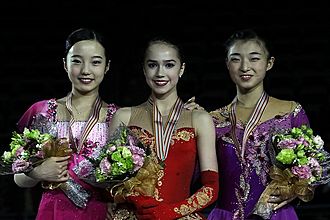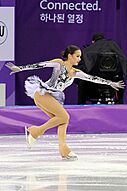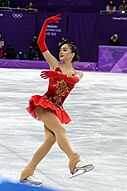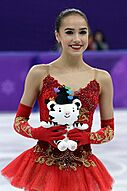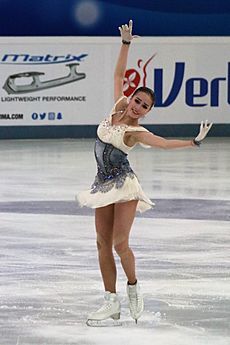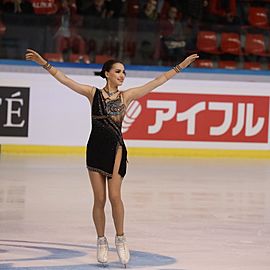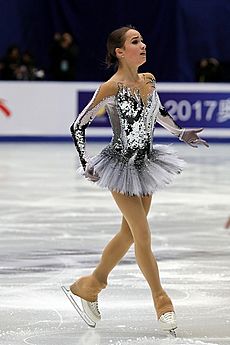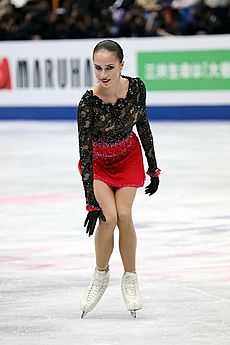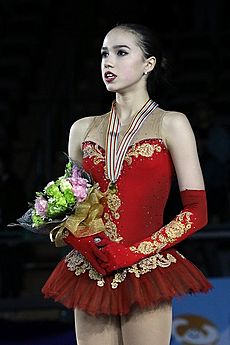Alina Zagitova facts for kids
Quick facts for kids Alina Zagitova |
|
|---|---|
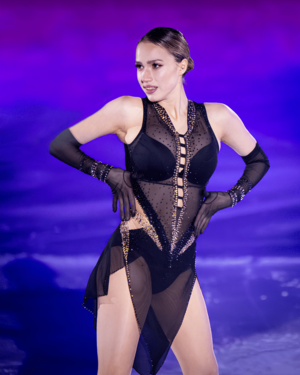
Zagitova in 2024
|
|
| Personal information | |
| Native name | Алина Ильназовна Загитова |
| Country represented | |
| Born | 18 May 2002 Izhevsk, Russia |
| Home town | Moscow, Russia |
| Height | 1.60 m (5 ft 3 in) |
| Coach | Eteri Tutberidze Sergei Dudakov Daniil Gleikhengauz |
| Skating club | Sambo-70 |
| Began skating | 2008 |
Alina Zagitova (born on May 18, 2002) is a famous Russian figure skater. She is known for winning many big competitions. Alina was the Olympic champion in 2018 and the World champion in 2019. She also won the European championship in 2018 and the Grand Prix Final in 2017–18.
Alina also earned a silver medal with her team at the 2018 Winter Olympics. When she was younger, she won gold at the World Junior Championships in 2017. She also won the Junior Grand Prix Final in 2016–17.
Alina Zagitova is one of the youngest skaters to win all the major titles in figure skating, both as a junior and a senior. She is also the second-youngest Olympic champion in women's single skating. She was famous for doing all her jumps in the second half of her programs. This gave her extra points. Because of this, a new rule was made to limit how many jumps could get this bonus. People sometimes call this the "Zagitova rule".
Alina took a break from competitive skating in the 2019–20 season and has not returned since. She has since worked as a TV host and commentator for figure skating events in Russia.
Contents
Alina's Early Life
Alina Zagitova was born in Izhevsk, Russia, on May 18, 2002. Her parents are Leysan and Ilnaz Zagitov. Her father was an ice hockey coach. Alina can understand the Tatar language, but she doesn't speak it. She has a younger sister named Sabina, who also skated. Alina was not named for a year until her parents decided to name her after the famous Russian gymnast, Alina Kabaeva.
Alina's father taught her how to skate when she was very young. She started skating at age four in Almetyevsk. Later, her family moved back to Izhevsk, and she trained with a new coach. When she was 13, she moved to Moscow with her grandmother to train with coach Eteri Tutberidze.
Alina's Skating Career
Starting Out in Skating
When Alina moved to Moscow, she started learning triple jumps. But she had some injuries, breaking her arm and then her leg. Her coach, Eteri Tutberidze, even removed her from the training group for a short time, but then decided to bring her back. In January 2016, Alina competed in her first big junior competition in Russia and finished ninth.
Becoming a Junior World Champion (2016–17)
For her first international season, Alina's coaches created special programs for her. She started doing all her jumps in the second half of her program. This gave her extra points and a big advantage over other skaters.
Alina's first international competition was in France in August 2016. She won the gold medal there. Her score was one of the highest ever for a junior women's skater. She then won a bronze medal in Slovenia. These results helped her qualify for the Junior Grand Prix Final in December. At this final event, Alina won the gold medal with a very high score. She was the first junior woman to score over 200 points.
Later that season, Alina competed at the senior level in Russia. She won the silver medal at the Russian Championships. In February, she won the gold medal at the Russian Junior Championships. She then won gold at the European Youth Olympic Festival. At the 2017 World Junior Championships in Taipei, Alina skated perfectly and won the gold medal. She set new junior world records for her free skate and total score.
Becoming an Olympic Champion (2017–18)
Alina was old enough to compete in senior international events in the 2017–18 season. She decided to keep her Don Quixote free skate from the previous season. She started her senior international career by winning the 2017 CS Lombardia Trophy.
For the Grand Prix Season, Alina competed in two events. She won gold at the Cup of China and the Internationaux de France. These wins qualified her for the 2017–18 Grand Prix Final. At the Grand Prix Final, she skated her best short program and then won the free skate. She became the Grand Prix Final champion.
Alina then won the 2018 Russian Championships. She also won the 2018 European Championships in Moscow. After these wins, she was chosen for the Russian Olympic team.
At the 2018 Winter Olympics, Alina helped her team win a silver medal. In the individual event, she skated a perfect short program and set a new world record score. In the free skate, she also performed very well. Alina won the gold medal at just 15 years old. She became the second-youngest Olympic champion in women's singles.
After the Olympics, Alina competed at the 2018 World Championships. She finished fifth overall, which was her only loss that season.
Becoming a World Champion (2018–19)
For the 2018–19 season, Alina had two new programs. She started her season by winning the 2018 Nebelhorn Trophy in Germany. Because of new rules, Alina set new world records for the short program, free skate, and total score. She also helped Team Europe finish second at the Japan Open.
Alina competed in two Grand Prix events. She won gold at the Grand Prix of Helsinki and the Rostelecom Cup. At the Rostelecom Cup, she broke her own world record in the short program. With two gold medals, she qualified for the 2018–19 Grand Prix Final. At the Grand Prix Final, Alina won the silver medal.
At the 2019 Russian Championships, Alina placed first in the short program. However, she had a difficult free skate and finished fifth overall. She was still chosen for the Russian team for the European Championships. At the 2019 European Championships, she won the silver medal.
After the European Championships, Alina went to the 2019 World Championships in Japan. She skated a clean short program and free program. She won the World title by a large margin. With this win, she became the first woman since 1985 to win the World Championships the season after winning the Olympics. She also became the second woman to achieve a "Super Slam," meaning she won all major international competitions at both junior and senior levels.
Taking a Break from Skating (2019–20)
Alina started the 2019–20 season with new programs. She placed second at the Japan Open.
For the Grand Prix season, Alina competed in France and Japan. She won a silver medal at the Internationaux de France. At the NHK Trophy, she finished third. These results qualified her for the Grand Prix Final. At the Grand Prix Final, she finished sixth overall.
After the Grand Prix Final, Alina announced she was taking a break from competitive figure skating. She did not compete in the 2020 Russian Championships or other major events. As of 2025, Alina has not returned to competitive skating, but she has not officially retired.
Alina's Skating Style
Alina Zagitova was known for her amazing energy and for doing all her difficult jumps in the second half of her programs. This strategy earned her extra points because skaters get a bonus for jumps performed when they are more tired. Some people thought this made her programs a bit unbalanced. To make things fairer, the ISU (International Skating Union) created a new rule after the 2017–18 season. This rule, sometimes called the "Zagitova rule", limits how many jumps can get the 10% bonus.
Alina was also famous for her triple Lutz-triple loop jump combination. This was one of the hardest jump combinations in women's skating when she won the Olympics. At the 2018 Olympics, experts noted that Alina's program was one of the most technically difficult ever performed by an Olympic gold medalist. However, by the time she took her break, other skaters had started doing even harder jumps, like quadruple jumps and triple Axels.
Alina's Life Outside Skating
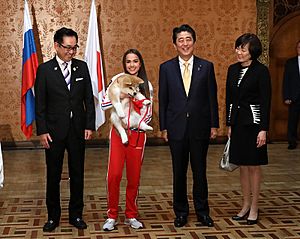
Alina Zagitova has an Akita dog named Masaru. She received Masaru as a gift from a Japanese breeder after the 2018 Pyeongchang Olympics. She has also had other pets, including cats and a chinchilla. Alina is a Muslim.
Alina finished high school in June 2020. She then went to the Russian Presidential Academy of National Economy and Public Administration to study journalism, and she completed her degree in July 2024. She is now studying for a second degree at the Russian State University of Physical Education, Sport, Youth and Tourism.
Alina's World Records
Alina Zagitova set world record scores five times at the senior level and five times at the junior level. In 2018, the International Skating Union (ISU) changed its scoring system. Because of this, all records set before the 2018–19 season are now called "historical" records. Alina's short program score from the 2018 Winter Olympics is still the historical world record.
- (J) means a junior world record score
| Date | Score | Segment | Event | Notes |
|---|---|---|---|---|
| 10 Dec 2016 | 70.92 | Short program (J) | 2016–17 Junior Grand Prix Final | Alina was the first junior woman to score over 70 points in the short program. |
| 11 Dec 2016 | 136.51 | Free skating (J) | Alina broke the record set by her teammate at the same event. | |
| 11 Dec 2016 | 207.43 | Combined total (J) | Alina was the first junior woman to score over 200 points. | |
| 19 Mar 2017 | 138.02 | Free skating (J) | 2017 World Junior Championships | This record was later broken by Alexandra Trusova. |
| 19 Mar 2017 | 208.60 | Combined total (J) | This record was later broken by Alexandra Trusova. | |
| 21 Feb 2018 | 82.92 | Short program | 2018 Winter Olympics | Alina broke the record set just minutes before by her teammate. This is the historical world record. |
| Date | Score | Segment | Event | Notes |
|---|---|---|---|---|
| 27 Sep 2018 | 79.93 | Short program | 2018 CS Nebelhorn Trophy | Alina broke Alexandra Trusova's record. |
| 28 Sep 2018 | 158.50 | Free skating | This record was later broken by Alexandra Trusova. | |
| 28 Sep 2018 | 238.43 | Combined total | This record was later broken by Alexandra Trusova. | |
| 17 Nov 2018 | 80.78 | Short program | 2018 Rostelecom Cup | This record was later broken by Rika Kihira. |
Alina's Programs
| Season | Short program | Free skate program | Exhibition program |
|---|---|---|---|
| 2016–17 |
Samson and Delilah
|
Don Quixote
|
The Pink Panther
|
| 2017–18 |
Black Swan
|
Don Quixote
|
"Afro Blue"
|
| 2018–19 |
|
Carmen Suite
|
"Survivor"
|
|
"Bad Guy"
|
|||
| 2019–20 |
"Me Voy"
|
Cleopatra
|
"Outro"
|
|
"Bad Guy"
|
|||
| 2020–21 | N/A | N/A |
"To Build a Home"
|
|
"Esmeralda"
|
|||
|
"Outro"
|
|||
| 2021–22 | N/A | N/A |
|
|
"Я"
(lit. I)
|
|||
|
"Esmeralda"
|
|||
| 2022–23 | N/A | N/A |
"Молчи и обнимай меня крепче"
(lit. Be silent and hug me tighter)
|
| 2023–24 | N/A | N/A |
"I Feel Like I'm Drowning"
|
|
"To Build a Home"
|
Alina's Competition Results
- GP – Event of the ISU Grand Prix Series
- JGP – Event of the ISU Junior Grand Prix Series
- CS – Event of the ISU Challenger Series
- Medals at team events are awarded for the team results only. Individual placements at team events are listed in parentheses.
| Season | 2016–17 | 2017–18 | 2018–19 | 2019–20 |
|---|---|---|---|---|
| Winter Olympics | 1st | |||
| Winter Olympics (Team event) | 2nd | |||
| World Championships | 5th | 1st | ||
| European Championships | 1st | 2nd | ||
| Grand Prix Final | 1st | 2nd | 6th | |
| Russian Championships | 2nd | 1st | 5th | WD |
| GP Cup of China | 1st | |||
| GP Finland | 1st | |||
| GP France | 1st | 2nd | ||
| GP NHK Trophy | 3rd | |||
| GP Rostelecom Cup | 1st | |||
| CS Lombardia Trophy | 1st | |||
| CS Nebelhorn Trophy | 1st | |||
| Japan Open | 1st (3rd) |
2nd (1st) |
1st (2nd) |
| Season | 2015–16 | 2016–17 |
|---|---|---|
| World Junior Championships | 1st | |
| Junior Grand Prix Final | 1st | |
| Russian Junior Championships | 9th | 1st |
| JGP France | 1st | |
| JGP Slovenia | 3rd | |
| European Youth Olympic Festival | 1st | |
| Russian Cup Final | 4th |
Images for kids
See also
 In Spanish: Alina Zaguítova para niños
In Spanish: Alina Zaguítova para niños
 | James B. Knighten |
 | Azellia White |
 | Willa Brown |


